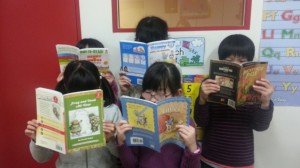Japanese are better at reading and writing English than at speaking it.
Anyone who has been teaching English in Japan for any amount of time has heard this oft-repeated statement. The interesting thing is that even through six years of English instruction, Japanese students don’t actually read that much material.
In a paper recently published in The Language Teacher, Kunitaro Mizuno states that if you combined the words from the junior and senior high textbooks New Horizon and Unicorn into a paperback book, that book would only have 157 pages! He goes on to say, “Since a paperback usually has about 250 pages, about 60% of one paperback is read during the six years.” So, the average high school graduate hasn’t even finished an entire English paperback novel!
Much has been written about the benefits of Extensive Reading in language learning, a movement that took hold in Japan about ten years ago. Extensive reading means reading a lot of text on your own from books of your own choosing, right at your level so you don’t need to use a dictionary. It is very easy to implement this into a language program, as students can read outside of class in their free time. Studying English this way can be very enjoyable because ideally the student is finishing the book, not to improve their English, but because they want to find out how the story ends!
BIG BOW English Lab is entering its tenth year today and we’ve had an Extensive Reading library from the very beginning. I’ve seen how encouraging young learners to create a reading habit can have a huge impact on the progress they make, especially in the case of returnee students. It would be amazing if a solid Extensive Reading program was implemented in every junior and senior high school in Japan. I think educators would be very pleasantly surprised by the results!






